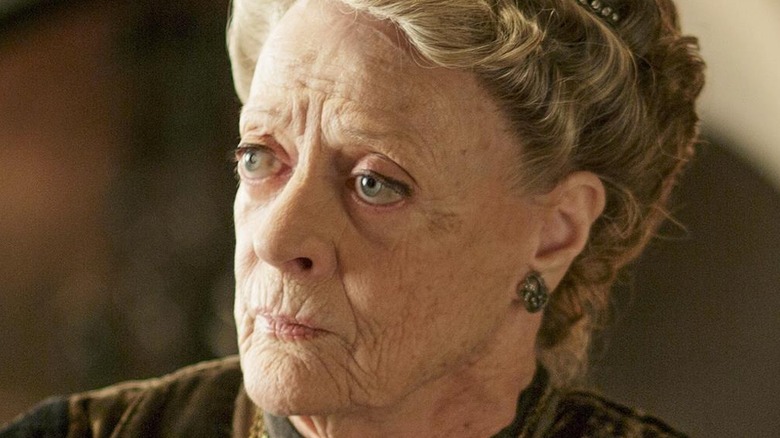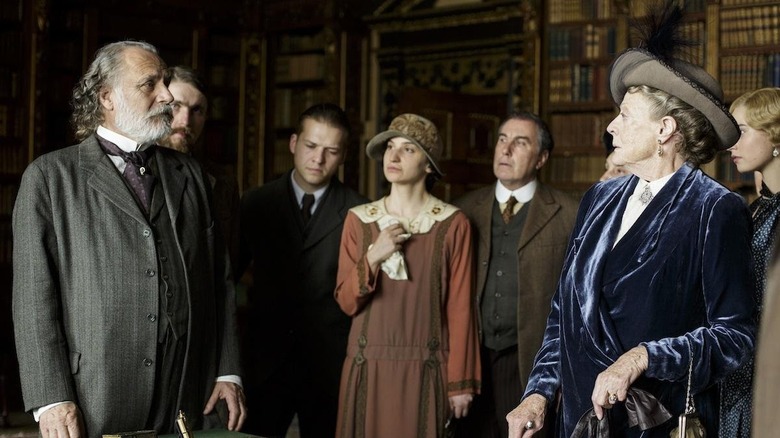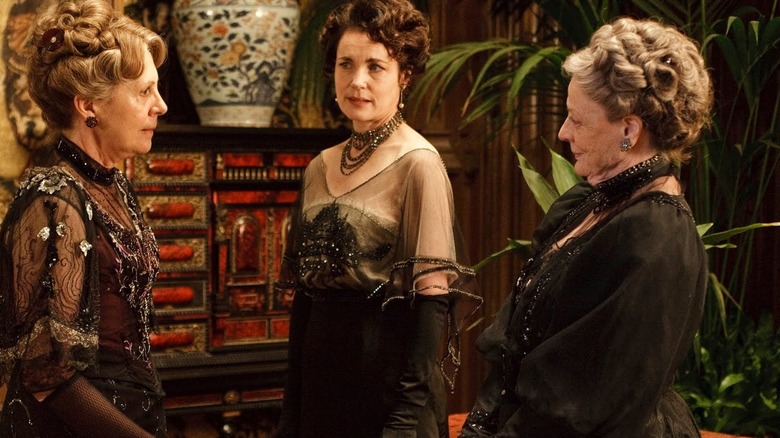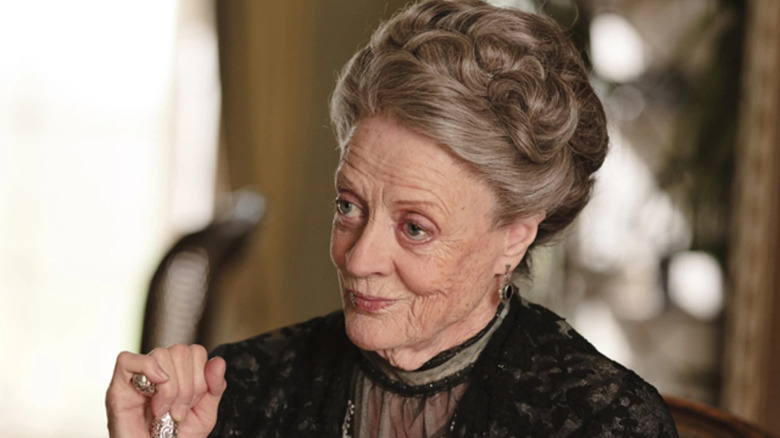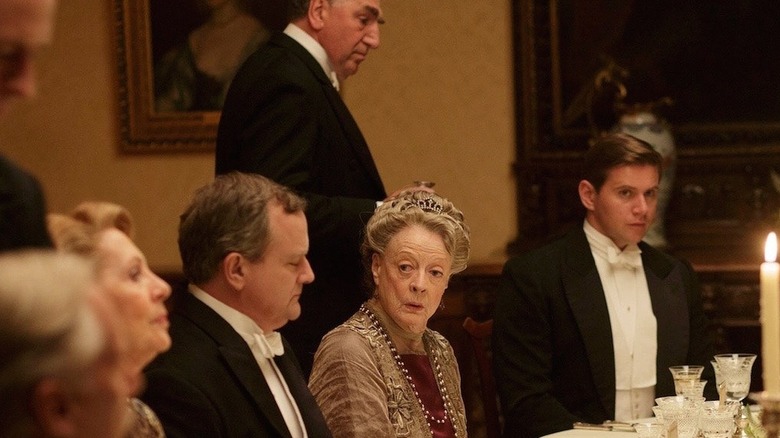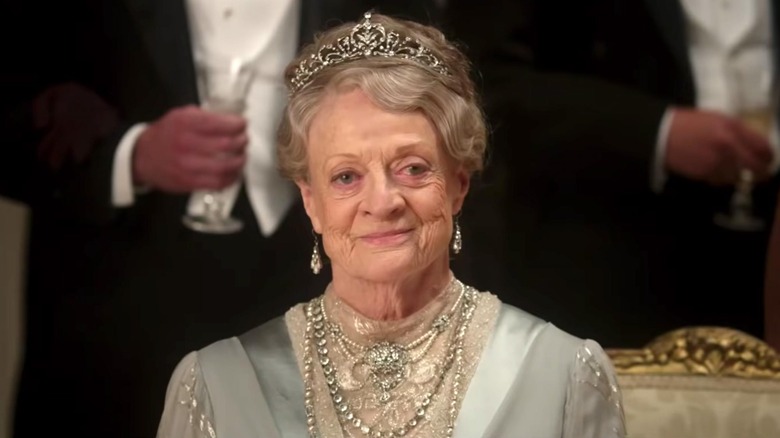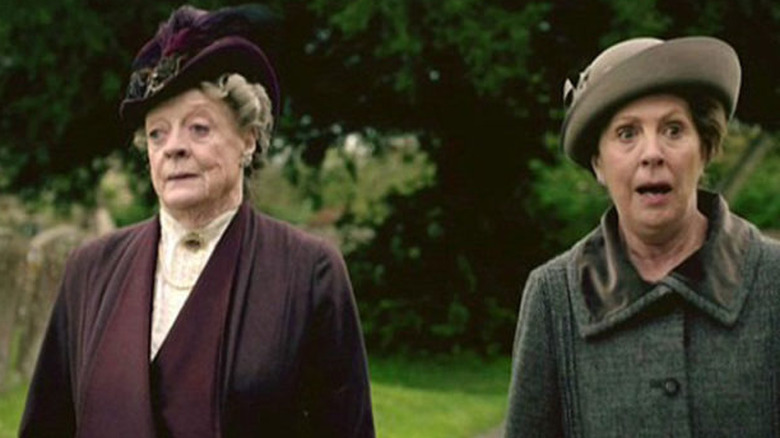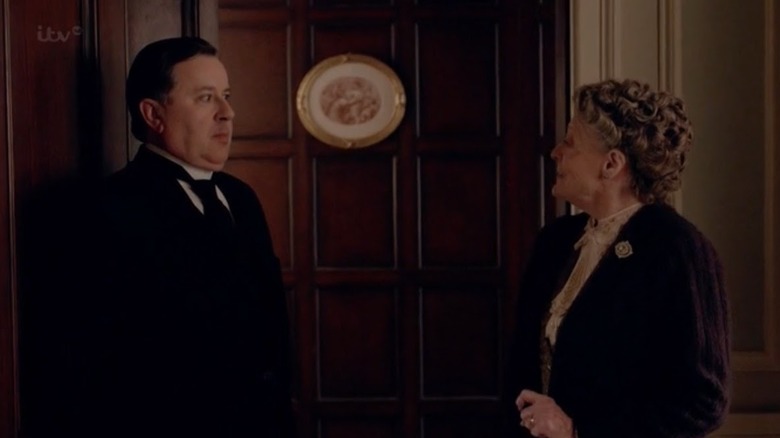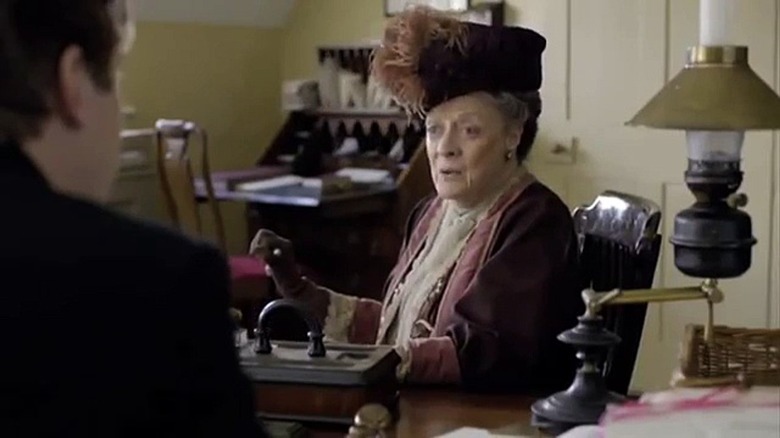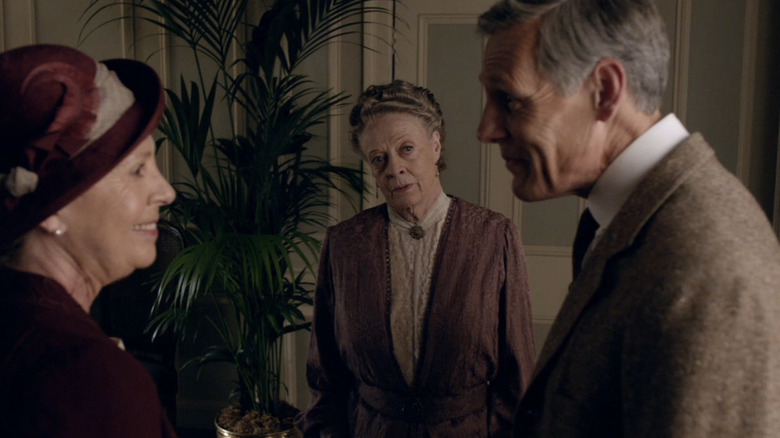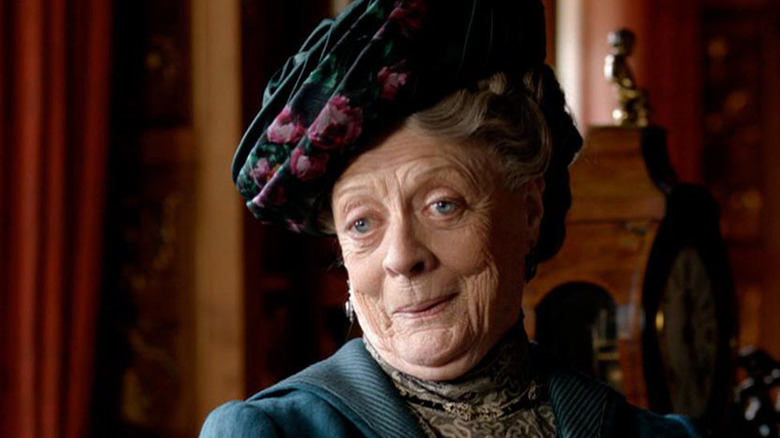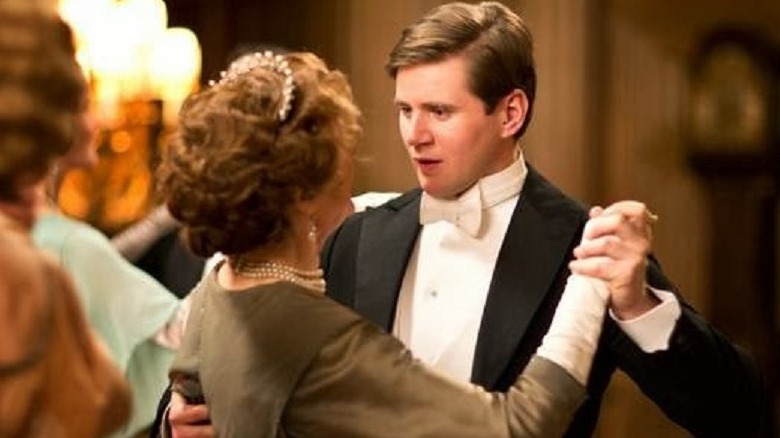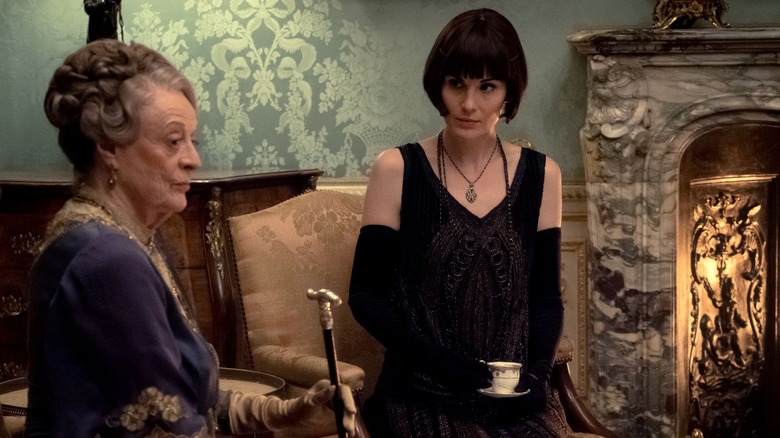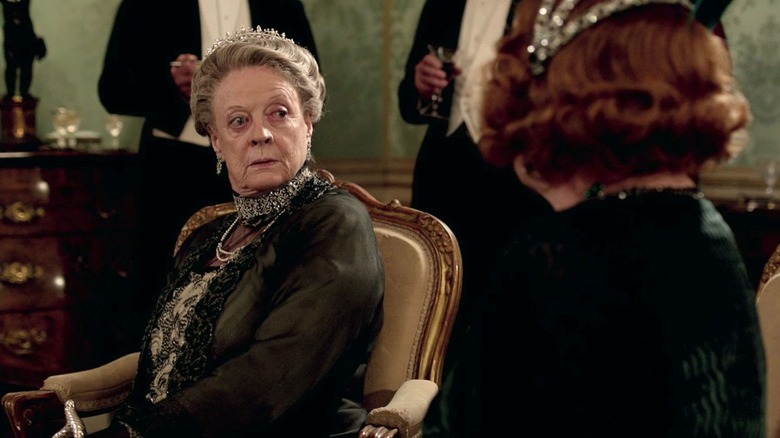The Best Dowager Countess Moments On Downton Abbey
How did a period drama about a bunch of wealthy snobs and their beleaguered servants capture the world's imagination? "Downton Abbey" was an amazing exploration family, wealth, and the last vestiges of the landed gentry. The films, with a second soon to drop, are testaments to the show's lasting popularity. With characters and storylines of love, loss and war ripped out of classic literature, it's arguably one of the more intellectual shows in recent memory with breathtaking backdrops and swooning romances. The best part of "Downton," though, was arguably always the Dowager Countess Violet Crawley.
She could be counted on to poke fun at the modern world, an old battle-ax who wore her title as the de facto elder stateswoman like a suit of armor. Her biting one-liners have inspired countless lists and Violet Crawley's fantastic quotes make us all wish we had some British wit, or at the least that she were our grandmother. Plus her savage burns could drop the mic on any modern-day rap feud. She also has heart and depth that comes out from time to time in moments of selflessness; other times, she impresses us all with her embrace of a modern world that obviously does not have many places for her. She may only be the widow of an Earl, but to all "Downton Abbey" fans she's a real queen.
Here are the moments when the Dowager Countess was truly at her best.
She almost gave up everything for love
In Season 5, the Russian aristocrats ousted by the Communist Revolution show up at Downton a shell of their former selves. With names taken from Tolstoy's masterpiece "War and Peace," they bring dramatic stories about the end of the old world with them. Along with those stories is one that shows that the old Dowager Countess was once a young, romantic woman bristling under her own class responsibilities.
When it's revealed that she almost ran away from her family, her title, her whole life with a Russian noble, Kuragin (the same name as the main character from Tolstoy's great work, as is his friend Rostov) with whom she'd fallen in love, everybody on the show (and all of us watching at home) see Violet in a completely different light. Her constant chiding about living a life of respectability and familial responsibility, full of morality and fidelity, is given some background. She understands that desire to run away to a life of romance free from the trappings of society. This also hints at the fact that underneath it all, Violet has been living with some pain and regret and she never complained about it.
We should start with Mrs. Crawley and Lady Grantham.
The show starts with a bit of English tradition unfathomable in the modern world — since Lord Grantham has only had daughters and his heir must be a man, a distant cousin named Matthew Crawley is the next in line and shows up to accept his inheritance.
Matthew comes with his mother Isobel, somewhat of a contemporary of Violet's though a lot less proper and much more enthusiastic about everything. Violet's dead husband was an Earl; Isobel's a doctor. Nobody likes this new arrangement, but Violet abhors the idea of turning her estate over to these less-than-aristocrats. When the bubbly Isobel introduces herself and asks what they should call each other, the Dowager replies "We should start with Mrs. Crawley and Lady Grantham."
Lady Grantham has grown up in British high society and by this point is too old to change. Even more, she sees it as her job to remind everybody, especially her grandchildren, of what that means. Sure there is a lot of stuffiness and outdated dryness in her way of doing things. Yet her adherence to tradition and formality feels almost refreshing in today's eternally casual world.
The irony about the acid in their meeting, of course, is that Isobel would go on to become Violet's closest friend.
Pulling rank on a vicar for the benefit of a servant
The servants at Downton Abbey are like family, though admittedly family that works considerably longer hours, lives in worse rooms, and rarely gets to partake in the festivities. While they are still working class, being part of a great house such as Downtown makes them the top of the working class in many ways, and one of those is that they are under the protection of the Crawleys. In Season 2, we get a glimpse of the Great War. We see servants and nobles fighting side by side in the trenches. We also see the Dowager Countess stick up quite a bit for a young servant boy, William. She's taken a liking to him, and when he saves the life of Matthew Crawley that only increases.
He is gravely injured in France and wants to marry the maid Daisy. Lady Grantham wants to do everything for this boy, from setting up medical care to arranging a vicar to marry Daisy and William despite his condition. Reverend Travis sees no reason why he should make such an accommodation for a man on his deathbed, a bit of snobbish adherence to "rules." So Dowager Countess tells him, "I would point out, your living is in Lord Grantham's gift. Your house is on Lord Grantham's land and the very flowers in your church are from Lord Grantham's garden. I hope it is not vulgar in me to suggest that you find some way to overcome your scruples."
Pulling rank on the church to fulfill the dying wish of a peasant servant is a truly wonderful thing.
Principles are like prayers; noble, of course, but awkward at a party.
The years following World War I were full of great upheaval and rebellion. Tom Branson, the chauffeur who became a member of the family by marrying and having a baby with the youngest daughter, has just finally been accepted as a member of the family when he brings a local schoolteacher and radical to a dinner party. She argues with Lord Grantham and eventually Violet ends the shouting match with a simple truth: "Principles are like prayers; noble, of course, but awkward at a party."
Ironically, the matriarch and representative of the old way of doing things at times can be less set in her ways than her son, the current Lord of the estate. Amidst her regular grumbling about tradition and decorum, Violet will roll out almost protofeminist ideas and champion youthful liberty. Living in an age where everybody seems modern and weird, Violet Crawley learns to accept that things progress and some of it is really good. Yet in this quote about principles, she makes a great point, one we all know about from those awkward Thanksgiving dinners: there is a time and place for socio-political debate.
Hiding her illness
This is an oddly polarizing point, that in the "Downton Abbey" movie the Dowager Countess had been hiding the fact that she's terminally ill. Some have argued that it is in fact the worst thing she did, not letting her family know she was dying so they could cherish their final moments with her. To which Lady Grantham would probably reply something like, "If they didn't cherish me for the last several decades of my life, why should a few months make any difference?"
Lady Grantham, for all her constantly needling, obviously cares deeply for the people that surround her. She certainly cherishes her moments with them (whether they're having a pleasant party or she's chiding them with some witty remark) and would assume they feel the same. Even more, knowing their lives have enough troubles and also knowing that the royal family was coming, she realizes that letting them sit around waiting for her to die would just get in the way of life, and truly life is more important to death.
No doubt the Dowager Countess didn't want to spend her last time on earth being sympathized with and fawned over. Even more, despite her desire to have the last word, she always seems (mostly) content to take a back seat to the living of those around her; this final secret is her own act of charity to herself and those she loves.
I must have said it wrong.
Lady Grantham has always won the flower competition though upon her arrival Mrs. Crawley says she only wins because she's an aristocrat and the format should be changed. "You are quite wonderful, the way you see room for improvement wherever you look. I never knew such reforming zeal," says Violet. Isobel, not one to back down, says, "I take that as a compliment," so Violet turns to her family and says, "I must have said it wrong."
The Dowager Countess calls out everybody; her insults, though, are said so well and with such perfect delivery and comedic timing that even the insulted wouldn't be able to get too angry. Plus she normally gets in her barb and retreats, never one to draw out a disagreement. Though woe be to the person who calls her out. Not only are her viewpoints on life relatively unflappable and based on strict logic, but she can also best anybody in such a battle of words. Isobel comes close a few times but certainly Violet has won more of those than she's lost.
Tells off her maid Denker in favor of the less scheming Spratt
As said before, the servants of Downton are an extension of the family. They are privy to intimate details that could fill a modern tabloid yet must keep their mouths shut. They also are tasked with upholding the standards and personality of the family they serve. Obviously, there will be infighting amongst the staff but that is nothing for the nobles to intervene in.
Spratt is Violet's butler and Denker her maid. She often chastises Spratt for being too stuffy and elitist, the irony of which is inescapable. Denker is her continually-scheming female servant, who seems to love causing trouble for her fellow workers, especially Spratt. She assumes Violet doesn't see her bitter jockeying for position, her blackmailing, and insults. Yet Spratt, for all his foibles, is nothing but a faithful servant. So when Denker reveals to Lady Grantham that Spratt has been writing a column for Lady Edith's newspaper, she finds the column amusing, not only showing her sense of humor but also telling off Denker for her scheming to remove a man who has been eternally loyal to Grantham, if not at times a little too officious.
How she plays them against one another when they bicker shows that despite what they may think, she knows everything going on and won't take dissension in the ranks.
Why must every day involve a fight with an American?
In Season 1 she visits Matthew Crawley's office where she sits in a swivel chair for the first time. She asks if it's a new invention and he says it was invented by Thomas Jefferson. "Why does every day involve a fight with an American?" she retorts and when he offers to replace it, she says, "No, no, I'm a good sailor."
The Dowager, being firmly from the 1800s, has trouble adjusting to the modern world. She dislikes America's embrace of innovation and lack of social mores (shown by her dislike of her daughter-in-law's wealthy American mother). Even more so, she has trouble agreeing that the new world is better. She finds the electric lights too bright (complaining about the vapors). She even has trouble talking on the telephone, calling it a torture device (though, admittedly, calling a place and having to get an operator to find and connect one with a certain person does sound annoying). She even has issues with the madness of jazz.
Lady Grantham has the misfortune of being an old lady during the beginning of the great innovations that would define the 20th century. Yet despite all her harping on it, even a landed old woman like herself can accept it.
She helps Isobel rescue Lord Merton
Throughout "Downtown Abbey," Dowager Countess Lady Grantham Violet Crawley has many rivals, but few as regular as Isobel Crawley. Yet in their constant back and forth the two become friends. So when Isobel explains how much she cares for Lord Merton, and how the man's children (whose snobbishness revealed at dinner disgusts literally every Crawley in the room) have taken him from her, Violet launches into action.
She starts by questioning and calling out Lord Merton's daughter-in-law, who she quickly deduces is simply playing the back and forth with the man to get his inheritance. When the kids essentially keep him captured in their home for a bigger piece of the pie, Lady Grantham swings into action. Using her title and power to barge in and gain Isobel entry, the daughter-in-law issues one desperate argument: "This is ridiculous. Father, Mrs. Crawley wants to take you away from your son and your family and kidnap you into marriage. What do you say?"
Lord Merton exhorts, "How perfectly marvelous," to which Violet simply replies, "And who can argue with that?" Despite all the back and forth, Isobel emerges as Lady Grantham's friend and despite all her flaws, it can be said that the Dowager Countess will happily use her standing, power, and wits to do anything for her friends and family.
No Englishman would dream of dying in someone else's house.
Early on in "Downton Abbey," the beautiful and mercurial Mary has a fling with a visiting foreign nobleman and he dies in her bed. While everybody is understandably aghast, her Granny says of course it would happen to a foreigner, a little bit of geriatric nationalism. Mary calls this ridiculous, to which Violet replies, "No Englishman would dream of dying in someone else's house."
The Dowager Countess loves to make these grand proclamations with so much authority that you almost miss the ridiculousness of them. She is especially proud of the dignity and history of the English, as befits the widow of an Earl. In the series finale, when her daughter asks what makes the English the way they are, Lady Grantham replies with her own tongue and cheek answer: "I don't know. Opinions differ. Some say our history, but I blame the weather."
It's the kind of absurd but absolutely lovely sentiment we cherish from the Dowager Countess, and as always it ensures she gets the final word in the conversation.
Supporting Tom, the former servant
When the truly loveable Sybil falls in love with the family's chauffeur, marries him, and becomes pregnant with his child, all are scandalized. Family overcomes tradition, though, and they bring the two back into the fold. When she dies, Tom is left with their child and questions about his future; he's taken in as a member of the Crawleys and slowly but humbly begins to grow into his role. Of course, not all are quick to give him real responsibility in the family business, but the Dowager Countess, being deceptively shrewd and clear-eyed (often more so than even her son and daughter-in-law, who are supposed to be younger and therefore more open to change) sees a great opportunity here.
The Dowager Countess was the one to originally send Tom and Sybil money to come to Mary and Matthew's wedding from their exile in America. After Sybil's death, she suggests the family name Tom Branson the estate land manager since, unlike the rest of the aristocrats, he actually has experience running a farm; for that matter, he's one of the few with any experience working at all. Violet never becomes "friends" with him per se (though that could be said about almost everybody), but she does embrace him as part of the family and like the rest appreciates all he has done to allow the family to keep Downton by revitalizing its businesses, a sign that old classist dogs can learn new tricks.
Just witness the scene in Season 8's Christmas special when she reminds Tom that this is his family and when he says they're not his people, she takes it as a challenge, followed by the two dancing.
In these moments you can usually find an Italian who's not too picky.
The Dowager Countess seems to have few hobbies. A main interest of hers, though, is matchmaking. Whenever the girls get in any sort of trouble that might besmirch their name, her first thought is always to figure out how they can ensure she'll find a good match. Her one-liners about romance run the gamut from upholding old stereotypes to admitting that women can have their own fun lives, and in some cases, she'll have both: "I do think a woman's place is eventually in the home, but I see no harm in her having some fun before she gets there."
Of course, as shown above, she has every angle covered when it comes to marrying the girls off to proper gentlemen ("Give him a date for when Mary's out of mourning. No one wants to kiss a girl in black.") Given her own romantic entanglements, it makes sense that she should be so interested in those of her granddaughters. Yet ironically, none of them ever seem to partner with the ones she wants them to partner with.
There's nothing simpler than avoiding people you don't like. Avoiding one's friends, that's the real test.
The Dowager Countess is an old battle-ax, and at the beginning of "Downton Abbey" it could be argued that she has no friends. No doubt it is due in part to her scathing, judgy zings; but on the other hand, these are no doubt a defense mechanism to hide from the world the fact that she suffers from pain and insecurity herself.
Watch as Isobel Crawley becomes, by the end, her truest friend and confidante, and how much she truly appreciates the woman she'd spent so long trading barbs with. Her insults about people breaking the decorum befitting a noble are tied in with her fears about this new modern world in which she feels she has no place. Plus there's her lost love, as well as her lost husband, both of which she has accepted with a (bitter) calm.
Violet Crawley is a cantankerous old dinosaur, no doubt, and she's never going to let her defenses down. The vulnerability she hides beneath her steely words and upright bearing, though, pop out from time to time and this may be why everybody takes her regular insults and jibes, and part of the reason why we all love the conservative, prejudiced, snarky stiff old lady so much.
